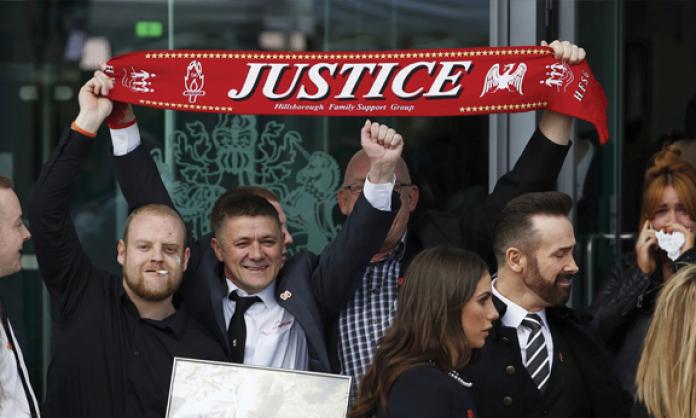This is what happened at Hillsborough on 15 April 1989: 96 fans of Liverpool football club were unlawfully killed, as a result of a breach of duty of care amounting to gross negligence on the part of the officer in charge of policing on the day.
A police force that was fresh from being used against striking miners, inculcated with contempt for football fans in general, and these fans in particular, created a situation of such overcrowding that people were crushed to death.
They then attempted to blame the fans themselves, drawing on every element of the establishment to concoct a myth that a gate had been forced open by drunk fans. In fact, the police themselves had opened the gate, and fans bore no responsibility.
All of this was true before the 26 April verdict; all of it we knew already. Four years ago, when the original inquest finding was overturned and more and more details of the collusion and corruption emerged, a thought kept occurring to me: “Didn’t we already know all this?” Certainly everyone in Liverpool did, as did most others with enough experience not to trust the police, the Tories or the Murdoch press.
But over the years myths had grown up and enough mud has been thrown that some of it stuck. Too many were willing to see one of the most serious miscarriages of justice in history as merely an unfortunate football event, bracketed with bad old days best left behind.
For that reason alone the verdict is an achievement. No longer will the families be fighting defensively to clear the names of their lost loved ones. It is clear in black and white, even if it was disgracefully long in coming. Indeed, if anything it may be time to go on the offensive, though criminal charges for those responsible look a long way off.
It’s impossible to write about Hillsborough without making it personal. That’s what so many of the accusations of sentimentalism fail to understand. It is an event that deeply marks the city and those from it, and one which forces you to take sides.
Hillsborough never affected me personally. I was not even four years old when it happened, and my family were neither from the city nor particularly engaged in football culture. But, growing up in Liverpool, I started to learn, to recognise the JFT 96 [justice for the 96] stickers in taxis and what they meant, to meet people involved with the justice campaigns, and to hear stories.
I remember vividly how weird it was whenever I went to other cities and saw people casually reading the Sun. It wasn’t even a political reaction – I just found seeing it completely bizarre. One of the many small ways things like Hillsborough made the city different. [Four days after the disaster, the Sun ran a headline “The Truth”, and wrote that Liverpool fans had been drunk, pickpocketed victims, urinated on and assaulted police officers. The paper was boycotted in the city and many newsagents still won’t sell it.]
And some of those things, I hope, will continue. This verdict should put to rest some myths, and, I sincerely hope, provide relief for some of the families.
But the lessons learned should remain: that police violence is not about one or two bad apples, but systemic and dehumanising; that “the establishment” is not the stuff of wild conspiracy theories, but networks of real, powerful people who have each other’s backs and for whom no lie or smear is too far; that sometimes you have to take sides, and the only “us against them” that really matters is working class people against an establishment that despises them.
And that sometimes, united, with strength, dignity, determination and passion, you can win, if not exactly justice, then vindication. You’ll Never Walk Alone.










